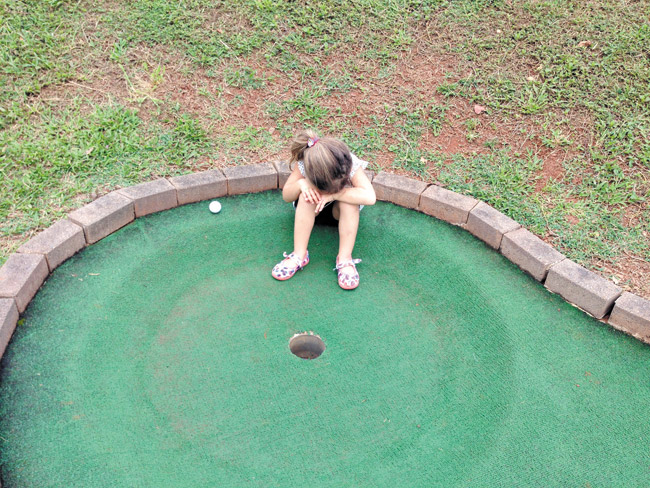The Value Of Dealing With Not Winning

Hana had a hard time after not making a hole-in-one all day. She is not the first to be crushed by golf
TANNYA JOAQUIN PHOTO
I win. You lose.The sting of those words is enough to make any child break down in tears.
Remember how we used to pick teams in the schoolyard? It was an exercise in cruelty as kids lined up and waited for their name to be called.
It was essentially a ranking in athletic ability and popularity by your peers with nowhere to hide.
But have we gone too far in the opposite direction? There’s an ongoing debate about America’s “everyone gets a trophy” phenomenon. Today, participation trophies and prizes are pretty much a given.
What used to be a true award for deserving performances has been watered down because, well, everyone gets one. Children and their parents come to expect them.
The harsh reality is, there are winners and losers. That’s life.
Drexel University psychology professor Charles Williams made waves last year by calling out the trophy mentality that’s taken over some youth leagues. His reasoning is simple: In real life, everybody does not get a trophy.
Williams went on to warn that, if young children don’t learn that lesson early, they’ll feel a sense of entitlement and struggle to compete in the real world as adults.
A disclaimer: My children do not yet compete in sports leagues, so this is something I have not experienced yet as a parent. I do, however, see this is an issue that will come up soon.
I have noticed the growing sibling rivalry between my kids.
Whether it’s a running race, shooting hoops or playing miniature golf, competition always is heated between big brother and little sister.
No trophies in their case, but bragging rights. At their age, they haven’t mastered the whole “good sportsmanship” thing. Especially when it’s a family battle.
Here’s how it usually goes down: My daughter teases my son that she has won and he protests. Shouting ensues. You’re wrong. No, you’re wrong. I won. No, I won. You lose.
That’s when Mommy or Daddy has to interject and attempt to use the occasion as a “teachable moment.” Now, diffusing the situation is a delicate, dangerous process. Why? Well, because one will feel like they won and the other will feel like they lost, and the parent will feel hopelessly stuck in the middle.
Add to the mix two very different personalities and it’s tricky to manage the situation. My son is sensitive and wears his heart on his sleeve. My daughter is kolohe and knows how to get under her big brother’s skin.
I haven’t resorted to anything as cheesy as “we’re all winners” yet, but I have to come up with a new game plan.
The last time we went to play putt-putt and my daughter didn’t sink a hole-in-one, she had a mini tantrum. I’m not sure if there’s a section on that in the parenting manual, but I definitely wouldn’t mind a crash course.
tjoaquin@hawaiinewsnow.com





